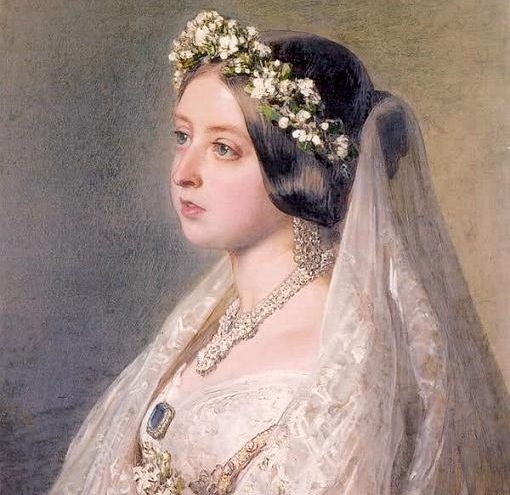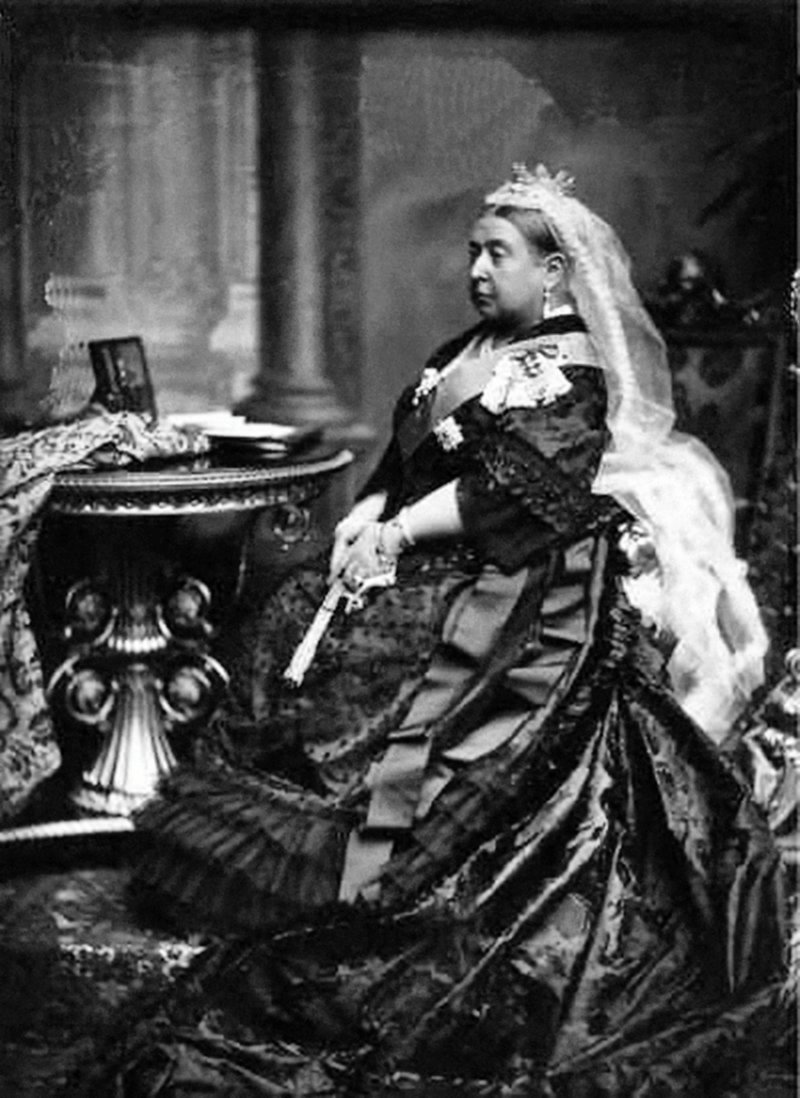“We r nt amused. #mydiaryleaked”
A month ago, at the push of a button and as a diamond jubilee gift to the world, Queen Elizabeth II put her great-great-grandmother’s complete journals online. Like WikiLeak’s Cablegate page, Queen Victoria’s Journals combines Web 1.0 aesthetics with a mind-numbing volume of content—except here, landing on the 99.9% of entries that are just plain dull1 doesn’t disappoint so much as prove the point. The sun may have never set on her empire, but the Queen–Empress’s daily routine seems about as constricted, tedious, and morally bankrupt as the average season (or rather, 63 seasons) of Keeping Up with the Kardashians.Not that Victoria’s inner life is bleak and mean, so much as non-existent—i.e., she’s more Khloé than Kim. This is a woman whose prose style is the same at age 30 as it was at 13 and will be at 80. One whose sole productive activity is, to go by her journal entries, writing in her journal. One who never passes on an opportunity for double exclamation points or triple underlines. One who loves sex with her husband but is mostly disgusted by the resultant babies. (Wouldn’t you be if you had to pop out 9 in 17 years—including a stretch of 6 in 8—for the good of the nation?) In other words, a social media natural.2After six decades in a job that measures success by the number of days you manage to stay alive, the present queen’s last rival left is Victoria.3 This would suggest some nefarious reasons for Elizabeth’s making her ancestress’s not-altogether-flattering scribblings public, but Victoria was ahead of her (eponymous) times on matters of self-exposure. Or as she noted Tuesday, January 24, 1843: “Wrote in my journal, which I am vain enough to think may perhaps some day be reduced to interesting memoirs.” Indeed, Victoria’s own handwritten originals are accompanied on the website by redacted copies made by her daughter Princess Beatrice—whose penmanship is even more inscrutable than Mom’s—and typescript versions by one Lord Esher. The former seems just the thing you’d make an annoying youngest child do; the latter proves that being a viscount isn’t all fun and fascinators.Prince Albert is hot—like really, really hot.
Unfortunately text-searchable transcriptions of the journals are currently only available to 1840 so it’s nigh-impossible to either confirm or disprove the one thing (NSFW!) Victoria’s dour, god-fearing, science-loving, hypercontrolling husband is these days known for. But suffice it to say the young Prince–Consort was Robert Pattinson dreamy. Except more Germanic. And dreamier.Tuesday, October 15, 1839Got up at 10, and breakfasted at ½ p. Saw my dear Cousins come home quite safe from the Hunt, and charge up the hill at an immense pace. Wrote to Feodore &c. Saw Esterhazy. Wrote to Victoire. At about ½ p.12, I sent for Albert; he came to the Closet where I was alone, and after a few minutes I said to him, that I thought he must be aware why I wished them to come here,- and that it would make me too happy if he would consent to what I wished (to marry me); we embraced each other over and over again, and he was so kind, so affectionate; oh! to feel I was, and am, loved by such an Angel as Albert, was too great delight to describe! he is perfection; perfection in every way,- in beauty – in everything! I told him I was quite unworthy of him and kissed his dear hand,- he said he would be very happy, "das Leben mit dir zu zubringen", and was so kind, and seemed so happy, that I really felt it was the happiest brightest moment in my life, which made up for all that I had suffered and endured. Oh! how I adore and love him, I cannot say!! how I will strive to make him feel as little as possible the great sacrifice he has made; I told him it was a great sacrifice,- which he wouldn’t allow; I then told him of the necessity of keeping it a secret, except to his father and Uncle Leopold and Stockmar, to whom he said he would send a Courier next day,- and also that it was to be as early as the beginning of February.Saturday, November 2, 1839Got up at 9 and breakfasted at ½ p. Wrote to Lord Melbourne. Read in Hallam, which I thought very interesting. Played on the piano. Wrote my journal. At 20 m. to 12 dearest Albert came to me, and he went and fetched Ernest, who was looking and felt much better. He sat on the sofa in the Closet with me, and dearest Albert sat in an armchair close to me. He went into Lehzen’s room for a moment, and went to look at some rooms; and Ernest afterwards went for a moment into the next room to see Clark. Dearest Albert took my face in both his hands and kissed me most tenderly, and said: "Ich habe dich so lieb, ich kann nicht sagen wie!" dearest Angel, so kind of him; and he said we should be "so glücklich"; if I can only make him happy!Saturday, November 9, 1839At a ½ p.6 my Precious Albert came to the Closet, and we stood by the fire together and talked together; he talked of his going, which grieved me so, that I began to cry; and he looked down into my face, with such an angelic expression in his dear beautiful face; I laid my heap on his bosom, and he wiped away my tours with his hand and took me and pressed me in his arms, and kissed me so often,- as I did him. We then sat on the sofa together, and dearest Albert put his arm round my waist, and leant quite close to me, and kissed my neck and head, and said "Du bist so herzlich gegen mich"; he is so fond of me! How blessed I am! How I do love him! I kissed his hand; and told him how happy I was, and how grateful I was to him. We went and played on the piano together, and he called me when he kissed me and was going away, "Vortrefflichste". Wrote my jour – nal. At 8 we dined. Only 16 at dinner.Dearest Albert took my face in both his hands and kissed me most tenderly, and said: "Ich habe dich so lieb, ich kann nicht sagen wie!"
—Monday, February 10, 1840 [Wedding Day]After looking about our rooms for a little while, I went and changed my gown, and then came back to his small sitting room where dearest Albert was sitting and playing; he had put on his Windsor coat; he took me on his knee, and kissed me and was so dear and kind. We had our dinner in our sitting room; but I had such a sick headache that I could eat nothing, and was obliged to lie down in the middle blue room for the remainder of the evening, on the sofa; but, ill or not, I never, never spent such an evening!! My dearest dearest dear Albert sat on a footstool by my side, and his excessive love and affection gave me feelings of heavenly love and happiness, I never could have hoped to have felt before! He clasped me in his arms, and we kissed each other again and again! His beauty, his sweetness and gentleness,- really how can I ever be thankful enough to have such a Husband! – At ½ p.10 I went and undressed and was very sick, and at 20 m. p.10 we both went to bed; (of course in one bed), to lie by his side, and in his arms, and on his dear bosom, and be called by names of tenderness, I have never yet heard used to me before – was bliss beyond belief! Oh! this was the happiest day of my life! – May God help me to do my duty as I ought and be worthy of such blessings!Tuesday, February 11, 1840When day dawned (for we did not sleep much) and I beheld that beautiful angelic face by my side, it was more than I can express! He does look so beautiful in his shirt. only, with his beautiful throat seen. We got up at a ¼ p.8. When I had laced I went to dearest Albert’s room, and we breakfasted together. He had a black velvet jacket on, without any neckcloth on, and looked more beautiful than it is possible for me to say; we sat talking together till 20 m. p.10. Wrote to Lord Melbourne, and Ma., from whom I had a letter. At 12 I walked out with my precious Angel, all alone – so delightful, on the Terrace and new Walk, arm in arm! Eos our only companion. We talked a great deal together. We came home at one, and had luncheon soon after. Poor dear Albert felt sick and uncomfortable, and lay down in my room,- while I wrote to Uncle Leopold. He looked so dear, lying there and dosing.He had a black velvet jacket on, without any neckcloth on, and looked more beautiful than it is possible for me to say
—Victoria’s entries on her pregnancies, confinements, and deliveries (Vicky, the mother of Kaiser Wilhelm II, arrived nine months and eleven days after the wedding) have yet to be transcribed, and far be it for this non-paleographer to attempt it. But the word “chloroform” is easily made out in the scrawl.Heavy is the head…

The young gossip girl. Via.
He looked so funny in his huge powdered wig and bad, brown silk coat and sword. And acted – Oh! inimitably!
—Saturday, June 13, 1835I awoke at 7 and got up at 8. At 9 we breakfasted. At 10 Lehzen and I walked out till ½ past 10. At 11 came the Dean till 12. At 12 came Mr. Westall till 1. At 1 we lunched. At 2 came the Duke and Duchess of Gordon. At ½ past 2 came the Dean till ½ past 3. At a ¼ to 5 Lehzen and I walked out till a ¼ past 5. At 6 we dined. Lady Flora dined here. At ½ past 7 we went with Lehzen, Lady Flora, and Charles to the Opera. It was "I Puritani" again. Grisi sang and acted throughout beautifully and looked lovely. The duet between Grisi and Lablache, in the beginning of the Opera, commencing with "O amato zio, o mio secondo padre!" is extremely beautiful. Rubini sang in his usual exquisite manner. Lablache and Tamburini likewise sang beautifully; but the former seemed to suffer from the heat, looked pale, and oppressed, and was not in his usual good spirits, though he acted extremely well.Tuesday, June 16, 1835I awoke at 7 and got up at 8. At 9 we breakfasted. At ½ past 9 Lehzen and I walked out till 10. At 11 came the Dean till 12. At 12 came Mr. Westall till 1. At 1 we lunched. At ½ past 2 came the Dean till ½ past 3. At 5 we went out with Lehzen till ½ past 5. At ½ past 6 we dined. At 10 minutes to 8 we went to the Opera with Lehzen and Charles. It was "Marino Faliero". Grisi was in perfect voice and acted and sang beautifully throughout. She sang the lovely duet "Vivi la mia memoria" with Rubini in the 1st act most beautifully; and she sang the beautiful scena in the 3rd act commencing with "Tutti or morte"" and concluding with "Fra due tombe, fra due spettri" splendidly; as also the splendid duet between her and Lablache in the last scene. Lablache was likewise in excellent voice and sung and acted beautifully. The splendid duet between him and Tamburini (who likewise sang beautifully) was beautifully sung by both and the latter part was loudly enchored. Lablache acted and sang the finale to the 2nd act beautifully. Rubini, last but not least, sang exquisitely.Friday, June 19, 1835I awoke at 7 and got up at a ¼ to 8. At a ¼ to 9 we breakfasted. At 10 we went out with Lehzen till a ¼ to 11. At 11 came M. Grandineau till 12. At 12 came the Dean till 1. At 1 we lunched. At ½ past 2 came Mme. Bourdin till 3. At 3 came the Dean till ½ past 3. At a ¼ past 5 we dined. At 20 minutes to 7 we went to the play to Covent Garden with Lehzen, Lady Conroy and Charles. It was Beethoven’s opera of "Fidelio" in 3 acts (translated into English). The characters are;Don Fernando(Minister of State), Mr. F. Cooke. Don Pizarro(Governor of the prison), Mr. Bedford who sang and acted shockingly! Don Florestano (a state prisoner unlawfully detained by the cruelty of Pizarro), Mr. Templeton who sang tollerably well. Rocco(the gaoler), Mr. E. Seguin, who sang and acted very well indeed. Leonora (the wife of Florestano and disguised as a young man under the fictitious name of Fidelio), Mme. Malibran who sang and acted most beautifully. Marcelline(Rocco’s daughter), Mrs. E. Seguin, who sang and acted very nicely. Malibran’s acting was perfect throughout, but her great triumph was in the cave-scene in the 3rd act, when Pizarro attempts to stab Florestano and she throws herself before him with her arm round his neck, exclaiming "Behold his wife!" And in a few minutes afterwards when Pizarro again attempts to stab her husband, she takes a pistol from her bosom and presents it to Pizarro which she did splendidly.How did Victoria spend the rest of June 1835? On the 20th, 23rd, 27th, and 30th, there were operas.Politics, and other emotions.

Queen Victoria on her Diamond Jubilee in 1897. Via.
Connections:


